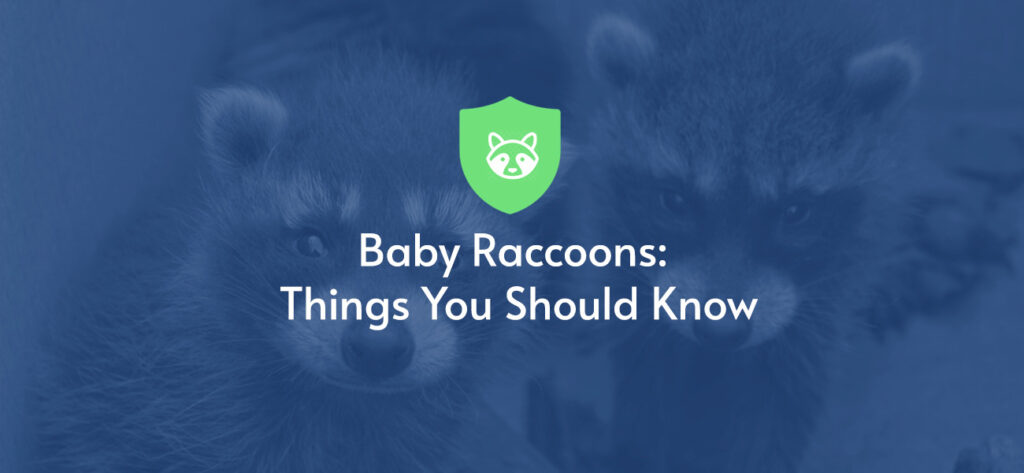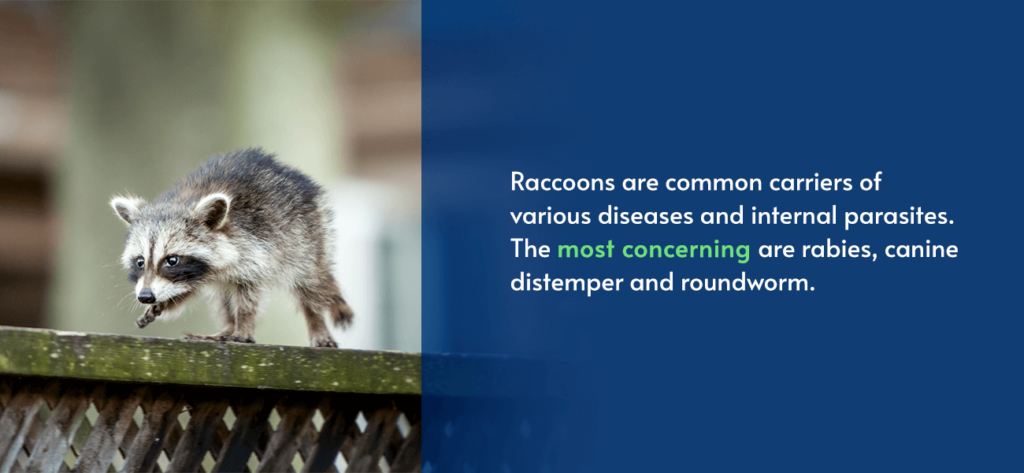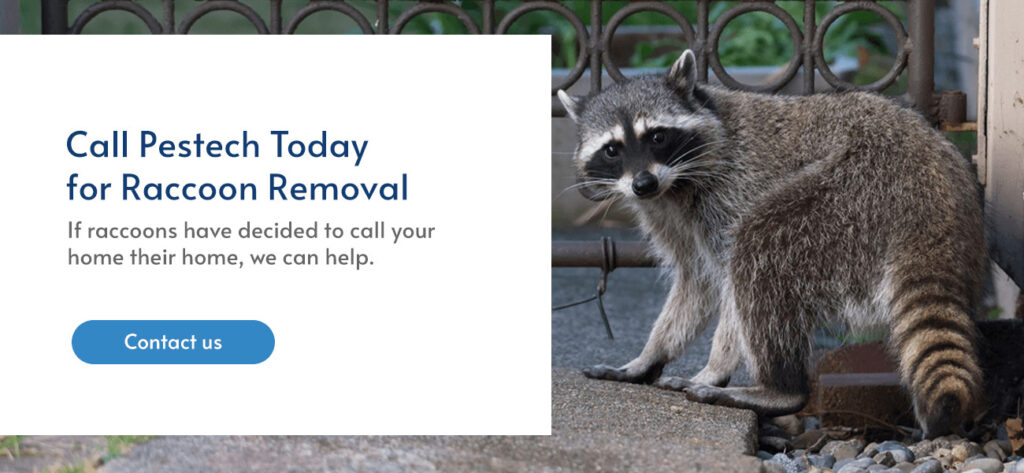Baby Raccoons: Things You Should Know

Raccoons are one of those cute animals you want to faun over from a safe distance. While they’re undoubtedly cute, they’re not as innocent as they may seem. In the wild, raccoons are beneficial predators that regulate the populations of various rodents. However, they cause many problems when their world overlaps with ours.
With that in mind, we’ve answered several baby raccoon FAQs so you can know the proper steps to take if you encounter one near or in your home.
Why Are Baby Raccoons a Problem?
Baby raccoons are adorable little menaces. While it’s easy to see pests like cockroaches, bats or skunks as problems, baby raccoons may make you feel somewhat conflicted. However, they can create serious issues . In many ways, the problems stem from their mothers, but baby raccoons can cause problems of their own.
Here are some ways that baby raccoons are problematic:
1. Nesting Sites Inside Your Building or Home
Raccoons go from endearing critters to nuisances the moment they start looking for nesting sites inside your home or building. As they search for shelter to give birth and nurture their young, they can cause significant damage to the internal structures of your home or building.
Mother raccoons may rip off fascia, shingles and rooftop vents to get inside your attic. They may also destroy insulation in your walls or around your air conditioners and heating ducts. Other areas they may find worthy of a home include uncapped chimneys or crawl spaces underneath porches or decks.
In addition to the damage they cause while looking for and building a nesting site, raccoons may also start using your home as their bathroom. In so doing, they may cause stains or mold in your walls and ceilings, not to mention an odor that will make you take back every nice thought you’ve had about raccoons.
As if that weren’t enough, raccoons may also bring in hitchhikers they’ve picked up along the way. If they’re rife with ectoparasites like lice, fleas or ticks, your pest problem will worsen.
2. Damage to Gardens and Backyard
If you have gardens, bird feeders or backyard ponds, raccoons can cause issues there, too. They’re particularly fond of sweet corn, and while they won’t dig holes in your lawn, they may roll up freshly laid turf in search of worms and grubs. They’re also skilled fishers, so any fish you have in backyard ponds may be vulnerable and attract raccoons to your yard.
If you live in a rural setting, raccoons may damage crops, poultry pens or eat duck or pheasant eggs.
3. Diseases and Parasites
Besides ectoparasites, raccoons are common carriers of various diseases and internal parasites. The most concerning diseases and parasites they carry are rabies, canine distemper and roundworm.
Raccoon roundworm can spread to people if you accidentally touch, inhale or ingest roundworm eggs from raccoon feces. As such, young children are particularly vulnerable. Raccoon roundworm can cause serious health issues.

When Are Raccoons Born?
Baby raccoons are usually born in April or May. The mating season for baby raccoons is between February and early March, and their gestation period is between 63 to 65 days. They typically have one litter that ranges from three to seven kits, with an average of four.
The babies are born blind and helpless and remain so until their eyes open after 18 to 24 days. They can live up to 16 years, but most don’t live past the second year. The average lifespan of raccoons who survive their youth in the wild is five years.
What Are Baby Raccoons Called?
You may call them cute and fluffy, or you may call them pests. Either way, baby raccoons are officially called “kits” or “cubs.” If you find a group of baby raccoons, they’re called a gaze or a nursery.
When Do Baby Raccoons Leave Their Mothers?
While raccoons become fully independent at 10 months, most raccoons strike out on their own at 13 to 14 months of age. Within one to two months, baby raccoons start making short trips away from their den and begin establishing more independence at three to four months. Around five months of age, they start foraging with their mother at night and den with her during the day. They remain with their mother through their first winter before experiencing the world untethered in the spring.
Mature raccoons often den near their mothers, even after setting out independently. The average age of reproductive maturity for raccoons is 24 months for males and eight to 12 months for females.
Are Baby Raccoons Dangerous?
When they’re first born, baby raccoons are about as dangerous as a baby kitten. They’re completely dependent on their mother for survival.
However, baby raccoons can be a source of danger. Like any protective mother, mother raccoons will fiercely protect their young from danger. If you leave baby raccoons and their mothers alone, they shouldn’t harm you, as you aren’t posing a threat. If they’re cornered, or the mother believes you’re a threat, they can be dangerous.
They can also pose dangers to your health if they carry infectious diseases or parasites like roundworm or rabies.
Signs of Raccoons in Your Home
Raccoons are crafty critters, but they leave a trail. While they can get into just about anything, they’re not skilled at covering their tracks. Some signs that raccoons have invaded your home include:
- Cries, whines, chirps or mews from baby kits or cubs.
- Rustling or thumping sounds in your walls, ceiling or floors.
- Damage to the shingles, fascia or vents on your roof.
- Frequent raccoon sightings on your property as the mother goes out to forage.
You may also find it helpful to know what raccoon tracks and droppings look like. Concerning their tracks, they have five toes on each foot with short, curved claws. Their hind feet are 4 and a half inches long, while their forefeet are about half that size. The distance between their hind feet and forefeet is approximately 6 inches. When you see their footprints, their hind footprint will likely appear on top of or beside their fore footprint.
Why Raccoon Removal Requires a Professional
Raccoons can be vicious if they feel trapped or threatened. While you certainly want to remove them from your home as soon as possible, doing so on your own can create more problems. It’s illegal to trap and transport raccoons without a license in New York, too. As such, it’s best to call a professional pest removal company to remove raccoons properly.
A professional pest removal company like Pestech has the expertise and protocols to ensure raccoon removal is carried out humanely and safely for all. Since raccoons potentially carry diseases and parasites, proper sanitary practices must be followed when removing raccoons from a nesting site.
Call Pestech Today for Raccoon Removal
If raccoons have decided to call your home their home, we can help. Our wildlife removal professionals at Pestech Pest Solutions understand how important it is that your home is a place where you and your guests can feel safe and secure from outside invaders — no matter how cute they may seem.
Call Pestech today to handle your raccoon removal the right way!

